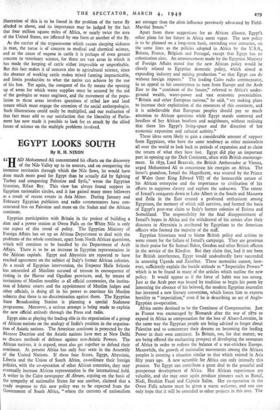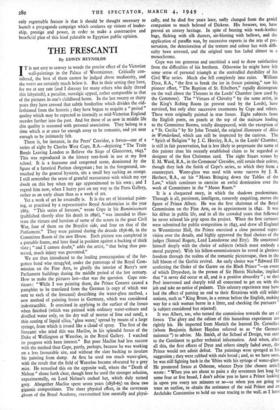EGYPT LOOKS SOUTH
By R. H. NIXON
,,llAD Mohammed Ali concentrated his efforts on the discovery of the Nile Valley up to its sources, and on conquering the immense territories through which the Nile flows, he would have done much more good for Egypt than he actually did by fighting Turkey and conquering Palestine and Syria," wrote the Egyptian historian, Rifaat Bey. This view has always found support in Egyptian nationalist circles, and it has gained many more followers as a result of recent events in Asia Minor. During January and February Egyptian publicists and radio commentators have con- centrated less on Palestine and more on the Sudan and the African continent.
Egyptian participation with Britain in the project of building a dam and a power station at Owen Falls on the White Nile is only one aspect of this trend of policy. The Egyptian Ministry of Foreign Affairs has set up an African Department to deal with the problems of the whole continent, apart from North African questions, which will continue to be handled by the Department of Arab Affairs. There is to be an increase in Egyptian representation in the African capitals. Egypt and Abyssinia are reported to have reached agreement on the subject of Italy's former African colonies. As a result of Egyptian intervention, the Emperor Haile Selassie has amnestied all Muslims accused of treason in consequence of rioting in the Harrar and Ogadino provinces, and, by means of invitations of Muslim notables to all official ceremonies, the institu- tion of Islamic courts and the appointment of Muslim judges and other officials, is doing all in his power to convince his Muslim subjects that there is no discrimination against them. The Egyptian State Broadcasting Station is planning a special Sudanese programme. Moreover, a serious attempt is being made to explain the new official attitude through the Press and radio.
Egypt aims at playing the leading role in the organisation of a group of African nations on the analogy of India's position in the organisa- tion of Asiatic nations. The American continent is protected by the Monroe Doctrine and the Asiatic nations have met at New Delhi to discuss methods of defence against non-Asiatic Powers. The African nations, it is argued, must also get together to defend their continent. At present Africa has only four seats in the Assembly of the United Nations. If these four States, Egypt, Abyssinia, Liberia and the Union of South Africa, co-ordinate their foreign policies, with the co-operation of other African countries, they may eventually increase African representation in the international field. A writer in the Cairo newspaper Al Ahram, arguing on the basis of the sympathy of nationalist States for one another, claimed that a ready response to this new policy was to be expected from the Government of South Africa, " where the currents of nationalism are stronger than the alien influence previously advocated by Field- Marshal Smuts."
Apart from these suggestions for an African alliance, Egypt's other plans for her future in Africa seem vague. The new policy is to be planned on a long-term basis, extending over centuries, on the same lines as the policies adopted in Africa by the U.S.A., Britain, France, Belgium and Portugal, except that Egypt has no colonisation aims. An announcement made by the Egyptian Ministry of Foreign Affairs stated that the new African policy would be closely related to Egyptian domestic policy, which aimed at expanding industry and mining production " so that Egypt can do without foreign imports." The leading Cairo radio commentator, in an appeal to his countrymen to turn from Europe and the Arab East to the " continent of the future," referred to Africa's under- ground wealth, water-power and vast economic potentialities. "Britain and other European nations," he said, " are making plans to increase their exploitation of the resources of this continent, and it is unbelievable that European peoples should pay so much attention to African questions while Egypt stands unmoved and heedless of her African brothers and neighbours, without realising that there lies Egypt's living-space and the direction of her economic expansion and cultural activity."
These ideas seem likely to gain a considerable amount of support from Egyptians, who have the same tendency as other nationalists all over the world to look back to periods of expansion and to claim the return of what they have lost. Egypt did play an important part in opening up the Dark Continent, often with British encourage- ment. In 1839, Lord Beauvale, the British Ambassador at Vienna, urged Mohammed Ali to concentrate his energies on Africa. The latter's grandson, Ismail the Magnificent, was assured by the Prince of Wales (later King Edward VII) of the honourable nature of his African enterprise and the importance to civilisation of his efforts to suppress slavery and explore the unknown. The extent of Ismail's conquests down to Lake Albert in the South and Massawa and Zeila in the East created a profound enthusiasm among Egyptians, the memory of which still survives, and formed the basis of Egypt's post-war claim to Italy's former colonies of Eritrea and Somaliland. The responsibility for the final disappointment of Ismail's hopes in Africa and the withdrawal of his armies after their disasters in Abyssinia is attributed by Egyptians to the American officers who formed the majority of the staff.
Egyptian historians tend to blame British policy and actions to some extent for the failure of Ismail's campaign. They are generous in their praise for Sir Samuel Baker, Gordon and other British officers in the service of the Khedive. But they claim that, had it not been for British interference, Egypt would undoubtedly have succeeded in annexing Uganda and Zanzibar. These memories cannot, how- ever, sufficiently explain the hostile attitude to " Imperialist Powers " which is to be found in many of the articles which outline the new policy. It would appear as if the force of habit was too strong. Just as the Arab poet was bound by tradition to begin his poem by lamenting the absence of his beloved, the modern Egyptian journalist has invented a new literary convention, which forces him to express hostility to " imperialism," even if he is describing an act of Anglo- Egyptian co-operation.
Africa seems destined to be the Continent of Compensation. Just as France was encouraged by Bismarck after the war of 1870 to expand in Africa as compensation for the loss of Alsace-Lorraine, in the same way the Egyptian people are being advised to forget about Palestine and to concentrate their dreams on becoming the leading Power in their own continent. In Britain, too, for that matter, we are being offered the enchanting prospect of developing the resources of Africa in order to redress the balance of a war-stricken Europe. Meanwhile, the growth of nationalist movements among the African peoples is creating a situation similar to that which existed in Asia fifty years ago. A new scramble for Africa can only intensify this process. Yet Egypt can contribute a great deal to the peaceful and prosperous development of Africa. Her African experiences are valuable, and she may once again produce pioneers such as Raouf, Nadi, Ibrahim Fauzi and Captain Salim. Her co-operation in the Owen Falls scheme must be given a warm welcome, and one can only hope that it will be extended to other projects in this area. The only regrettable feature is that it should be thought necessary to launch a propaganda campaign which conjures up visions of leader- ship, prestige and power, in order to make a constructive and beneficial plan of this kind palatable to Egyptian public opinion.







































 Previous page
Previous page